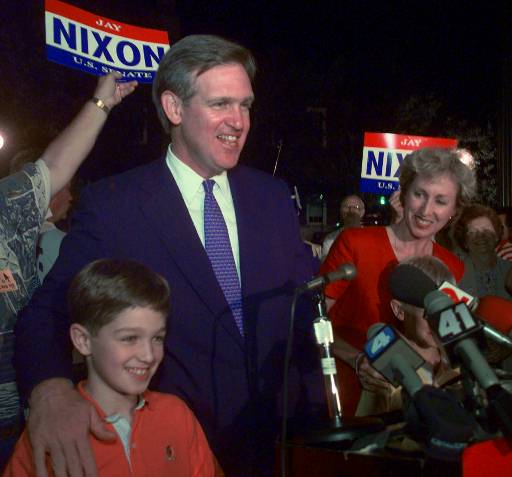In Nixon v. Shrink Missouri Government PAC, 528 U.S. 277 (2000), the Supreme Court concluded that Missouri’s political contribution limits did not infringe on the First Amendment guarantees of free speech and association and the Fourteenth Amendment’s equal protection clause.
Missouri’s political contribution limits were challenged
A state political committee and a candidate for state auditor sought an injunction against enforcement of the law, arguing that the adjusted contribution limit of $1,075 for statewide office, down to $275 for lower offices, violated the First Amendment. The district court granted summary judgment for the state (and Attorney General of Missouri Jeremiah W. Nixon), but the Eighth Circuit Court of Appeals reversed, applying strict scrutiny and holding that the state had not produced evidence that the contribution limit was in response to corruption from large contributions.
Court upheld limits
Justice David H. Souter, writing for the Court’s majority, defended the approach, first articulated by the Court in Buckley v. Valeo (1976), of evaluating contribution limits under a less rigorous test than that of spending limits. He observed that the evidence required to sustain a law will vary with the novelty of the law and with whether those challenging the law could show evidence casting doubt on the conclusion that large contributions should be regulated. Souter also found that there was no evidence that the state’s limits “prevented candidate or political committees from amassing the resources necessary for effective advocacy.” The test for whether a contribution limit was unconstitutional was “whether the contribution limitation was so radical in effect as to render political association ineffective, drive the sound of a candidate’s voice below the level of notice, and render contributions pointless.”
Justice Stephen G. Breyer’s concurrence, joined by Justice Ruth Bader Ginsburg, argued that when considering contribution limits, “constitutionally protected interests lie on both sides” and the presumption of unconstitutionality implied by “strict scrutiny” was incorrect. Contribution limits, argued Breyer, democratize the influence of money and make the process “fairer and more democratic.” Moreover, Breyer believed that legislatures have expertise in regulating campaign finance deserving judicial deference.
Dissenters thought contribution limits deserved strict scrutiny
Justice Anthony M. Kennedy dissented and called for the overruling of Buckley because it did not provide sufficient protection for political speech. Also in dissent, Justice Clarence Thomas, joined by Justice Antonin Scalia, agreed that Buckley was a flawed decision, allowing the regulation of political contributions while protecting “begging, shouting obscenities, erecting tables on a sidewalk and refusing to wear a necktie.” He also concluded that contribution limits deserved strict scrutiny and Buckley’s holding to the contrary should be abandoned. He castigated the majority for adopting a vague definition of corruption that allows the government to impose broad restrictions on campaign finance activity.
Allison Hayward is an elections and ethics attorney in California. She serves on the board of the Office of Congressional Ethics and on the California Fair Political Practices Commission. This article was originally published in 2009.

